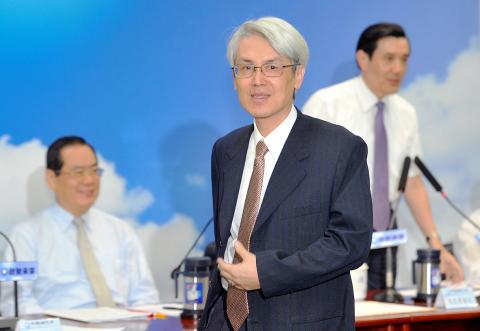Minister Without Portfolio James Hsueh (薛承泰) yesterday warned that the second-generation National Health Insurance (NHI) program could disintegrate by 2025 because of the doubling of the elderly demographic and called for policies to address the problems of an aging society.
The population of individuals aged 65 years and over in Taiwan tripled from 2000 to 2010, and the medical costs of the age group under the NHI program have increased 88 percent to NT$169 billion (US$5.3 billion) during that period, Hsueh said in a report on the nation’s population outlook in 2025 to the Chinese Nationalist Party’s (KMT) Central Standing Committee.
By 2025, the cost will be more than double that of 2010, bringing more financial difficulties for the NHI program, he said.

Photo: Chien Jung-fong, Taipei Times
“The NHI program is an example of a government policy that was designed without taking demographics into consideration ... Without proper solutions, the program could drag the government down by 2025,” he said.
The Department of Health proposed revisions to the NHI program last month under which the insured would have to pay a 2 percent premium on income of more than NT$2,000 earned from six sources: bonuses more than four times the individual’s monthly salary, professional practice, share dividends, interest, rent and moonlighting. The threshold was later revised to income of more than NT$5,000.
In response, President Ma Ying-jeou (馬英九) insisted that the program would not incur any debts in the next five years and promised to find solutions.
“It’s impossible for the second-generation NHI program to stay unchanged forever ... There are some difficulties in implementing the program, but we will find solutions and make the program better,” he said.
Hsueh yesterday also questioned the government’s policies on pensions and the increasing numbers of high schools and colleges under an aging population.
He said that more colleges would be shut down due to low attendance rates 10 years from now because of the lower birthrate, while the government will suffer from the lack of a long-term care system for the elderly.
Ma said people aged 65 and over would account for 20 percent of the total population in 2025, adding that the government had taken action to address the issue, including passing legislation on long-term care for the elderly and attracting foreign students to attend local universities.

Chinese Nationalist Party (KMT) Chairman Eric Chu (朱立倫), spokeswoman Yang Chih-yu (楊智伃) and Legislator Hsieh Lung-chieh (謝龍介) would be summoned by police for questioning for leading an illegal assembly on Thursday evening last week, Minister of the Interior Liu Shyh-fang (劉世芳) said today. The three KMT officials led an assembly outside the Taipei City Prosecutors’ Office, a restricted area where public assembly is not allowed, protesting the questioning of several KMT staff and searches of KMT headquarters and offices in a recall petition forgery case. Chu, Yang and Hsieh are all suspected of contravening the Assembly and Parade Act (集會遊行法) by holding

PRAISE: Japanese visitor Takashi Kubota said the Taiwanese temple architecture images showcased in the AI Art Gallery were the most impressive displays he saw Taiwan does not have an official pavilion at the World Expo in Osaka, Japan, because of its diplomatic predicament, but the government-backed Tech World pavilion is drawing interest with its unique recreations of works by Taiwanese artists. The pavilion features an artificial intelligence (AI)-based art gallery showcasing works of famous Taiwanese artists from the Japanese colonial period using innovative technologies. Among its main simulated displays are Eastern gouache paintings by Chen Chin (陳進), Lin Yu-shan (林玉山) and Kuo Hsueh-hu (郭雪湖), who were the three young Taiwanese painters selected for the East Asian Painting exhibition in 1927. Gouache is a water-based

Taiwan would welcome the return of Honduras as a diplomatic ally if its next president decides to make such a move, Minister of Foreign Affairs Lin Chia-lung (林佳龍) said yesterday. “Of course, we would welcome Honduras if they want to restore diplomatic ties with Taiwan after their elections,” Lin said at a meeting of the legislature’s Foreign Affairs and National Defense Committee, when asked to comment on statements made by two of the three Honduran presidential candidates during the presidential campaign in the Central American country. Taiwan is paying close attention to the region as a whole in the wake of a

OFF-TARGET: More than 30,000 participants were expected to take part in the Games next month, but only 6,550 foreign and 19,400 Taiwanese athletes have registered Taipei city councilors yesterday blasted the organizers of next month’s World Masters Games over sudden timetable and venue changes, which they said have caused thousands of participants to back out of the international sporting event, among other organizational issues. They also cited visa delays and political interference by China as reasons many foreign athletes are requesting refunds for the event, to be held from May 17 to 30. Jointly organized by the Taipei and New Taipei City governments, the games have been rocked by numerous controversies since preparations began in 2020. Taipei City Councilor Lin Yen-feng (林延鳳) said yesterday that new measures by